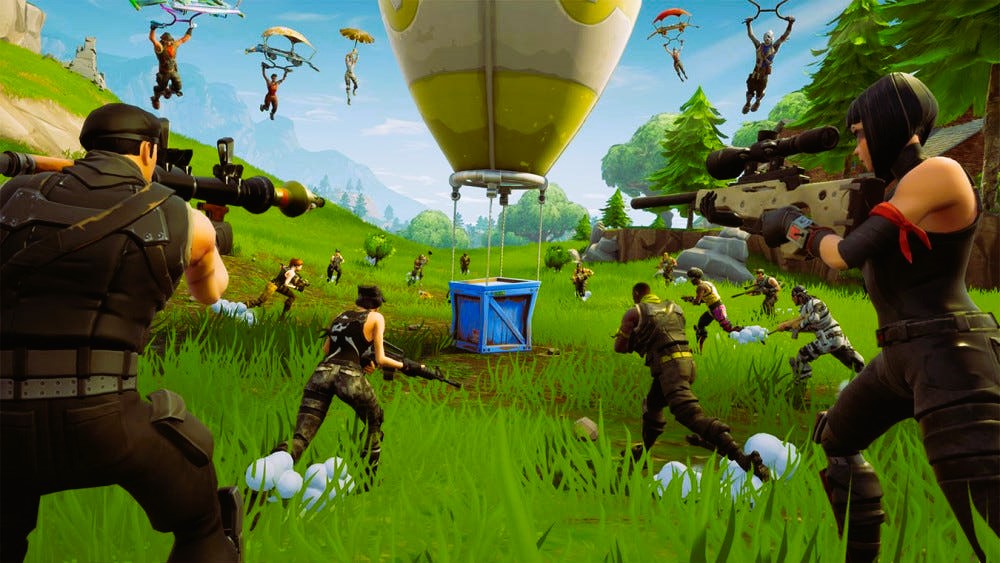Fortnite is one of the most popular battle royale games in the world, drawing millions of players every day. As with any competitive game, winning requires a combination of skill, strategy, and mental fortitude. In Fortnite, two psychological traits often come into play: aggression and strategy. Both play a critical role in determining a player’s success, but understanding how to balance the two can be the difference between victory and defeat. In this article, we’ll explore the psychology of winning in Fortnite, focusing on the fine line between aggression and strategy.
Aggression in Fortnite: When to Go All-In
Aggression in Fortnite can be defined as the act of actively seeking out opponents and engaging in combat, often without waiting for the perfect opportunity or carefully planning the approach. Many players are naturally drawn to aggressive playstyles, as the action and adrenaline rush can be incredibly rewarding. However, while aggression can sometimes lead to quick eliminations, it can also result in careless decisions and costly mistakes.
The Benefits of Aggression
- Taking Control of the Game: Aggressive players can control the pace of the game. By actively hunting down opponents, they can dictate the terms of engagement, forcing others to react instead of taking the initiative.
- Disrupting Opponents: Aggressive playstyles can disrupt the flow of a match for other players. By attacking without warning, you force enemies to focus on defense rather than strategy, throwing them off balance and often leading to easy eliminations.
- Building Confidence: Successful aggressive plays can build a player’s confidence, encouraging them to take more risks and assert control in future engagements.
The Drawbacks of Aggression
- Exposing Vulnerabilities: Constant aggression can leave you open to counter-attacks. If you’re too focused on taking out opponents quickly, you might overlook environmental threats or fail to build effective defenses.
- Resource Depletion: Aggressive play often leads to faster consumption of materials, which may not be sustainable in the long run, especially when facing multiple opponents in the late stages of the game.
- Emotional Fatigue: The adrenaline rush associated with aggressive play can sometimes lead to mental fatigue. This exhaustion can cause poor decision-making or emotional burnout, hindering performance in the later stages of the game. Did you like our article? Read also about Emotional Resilience.
Strategic Play in Fortnite: Patience and Precision

In contrast to aggression, strategy involves a more calculated, patient approach. Strategic players tend to avoid unnecessary conflicts and focus on positioning, resource management, and analyzing opponents’ moves. Strategy often includes a careful balance between offense and defense, allowing players to wait for the right moment to strike.
The Benefits of Strategic Play
- Preserving Resources: Strategic players tend to conserve their resources and use them wisely. They spend time gathering materials and supplies early on, setting themselves up for success in the later stages of the game.
- Improved Positioning: By focusing on strategy, players can choose better positions on the map, allowing them to control areas of high value while staying out of sight. A solid strategic position can help players avoid unnecessary fights, leading to more controlled engagements.
- Better Endgame Performance: Strategic players often excel in the endgame, where resources and space become limited. Their careful planning and calm demeanor allow them to adapt to changing circumstances and make precise, calculated decisions that can lead to victory.
The Drawbacks of Strategy
- Missed Opportunities: A strategy-focused player may hesitate at critical moments, giving aggressive players an advantage. In Fortnite, timing is essential, and waiting too long to engage can result in missed eliminations or being outplayed.
- Risk of Overthinking: While strategy is valuable, it can sometimes lead to overthinking and indecision, especially when a player second-guesses their moves. This can lead to confusion and missed chances to capitalize on a favorable situation.
- Vulnerability to Aggressive Players: While being patient can help conserve resources, it can also put strategic players at risk of being overwhelmed by more aggressive opponents who aren’t afraid to take the initiative.
The Balance: When Aggression and Strategy Work Together
So, which is better: aggression or strategy? The truth is that both traits are important in Fortnite, but finding a balance between the two can lead to the most successful outcomes.
- Adaptive Playstyle: The best Fortnite players know when to switch between aggression and strategy. Early in the game, they might focus on resource gathering and positioning (strategy), but when it comes to the final stages, they’ll shift into an aggressive playstyle to push for eliminations and secure a victory.
- Understanding the Opponent: A strategic player will assess their opponents’ tendencies, determining when to engage aggressively and when to fall back and wait for a better opportunity. This psychological adaptability is key to winning.
- Risk Management: Successful players manage risks effectively. They know when it’s worth taking a risk with aggression and when to play it safe and focus on positioning. Knowing when to act impulsively and when to wait is crucial to success.
In Fortnite, both aggression and strategy have their place, and understanding when to deploy each can make all the difference between victory and defeat. While aggression can help you control the game and eliminate threats, strategy is essential for preserving resources, positioning, and executing a successful endgame plan. Mastering the art of balancing these two psychological traits is key to becoming a Fortnite champion.
For more insights into gaming psychology and strategies, visit Wikipedia’s page on Game Theory to learn more about how strategic thinking and aggression can shape competitive environments.




